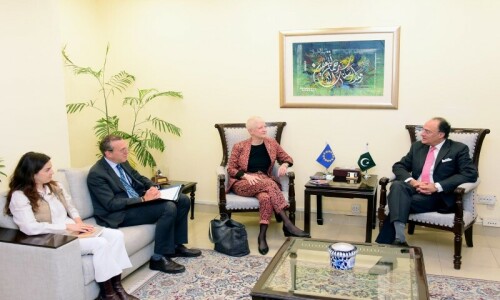Ties with Afghanistan

AFGHAN President Ashraf Ghani’s inaugural visit to Pakistan may not have yielded any immediate breakthrough or produced a dramatic announcement, but it did at least take place in a more cordial and cooperative manner than the one which characterised Pak-Afghan relations during the Karzai era.
Yet whatever the quiet diplomacy and serious security-related discussions that surely took place behind closed doors over the weekend, a genuine and lasting improvement in relations would necessarily require moves in the public domain too. What, for example, is the state of reconciliation talks with the Afghan Taliban?
Know more: Let’s bury the past and move on, says Afghan president
With 2014 rapidly drawing to a close, all other major events expected to take place this year have been largely navigated. Hamid Karzai exited without too much of a fuss; an election was held and winners eventually found.
The foreign troop drawdown has progressed smoothly, with the Taliban making some gains but by no means being able to overrun the Afghan-led security forces.
Meanwhile, the US got the deal that would allow a residual force in Afghanistan to stay on while ensuring economic assistance continues.
The one significant unknown is the ability of the new, hybrid government in Afghanistan to deliver on the governance front. But all of that will mean little if there is no lasting settlement with the Afghan Taliban.
The Pakistani state has showed some willingness to disrupt sanctuaries of some Afghan-centric militants in the North Waziristan operation, indicating that old policies may in fact be shifting.
Yet the real proof of changed policies and intentions will lie in the state here using its leverage to bring the Afghan Taliban back to the negotiating table. It can only be hoped that quiet diplomacy, bilateral and also international, will produce results soon rather than allow events to overtake opportunities.
In at least one way, events have already complicated opportunities and the bilateral relationship: the militancy threat radiating into Pakistan from Afghanistan.
Without security cooperation, better border management and joint efforts to curb cross-border movement of militants, the problem of Pakistan-centric militants seeking sanctuary in Afghanistan will only grow and make cooperation on the original problem, the Afghan Taliban, that much more difficult. Which is why Mr Ghani’s accommodating and conciliatory language on Pakistan is all the more important – a reset in ties is needed to allow for ties to stabilise. The long-term vision articulated by both sides of a region that is a trading hub and economic corridor is the right one. But security will have to be addressed quickly. Without security there will be no stability and without stability, national potential will not be realised.
Published in Dawn, November 17th, 2014













































